Chronic Inflammation: Mechanisms Leading to Cancer - An Essay
VerifiedAdded on 2023/06/15
|9
|2007
|81
Essay
AI Summary
This essay delves into the intricate relationship between chronic inflammation and cancer development, examining the cellular and molecular mechanisms that contribute to carcinogenesis. It highlights the roles of cytokines, reactive oxygen species (ROS), and other immunological mediators in promoting tumor growth, angiogenesis, and metastasis. The discussion encompasses the impact of persistent inflammation caused by conditions like gastritis and colitis, emphasizing the structural instability induced in DNA and the suppression of apoptosis. The essay further explores the roles of JAK-STAT3 signaling, TNF-α, IL-6, TGF-β, and IL-10 in the carcinogenic process, and also touches upon the potential therapeutic strategies targeting these factors. The essay concludes that understanding and targeting these inflammatory mediators holds promise for cancer prevention and treatment.
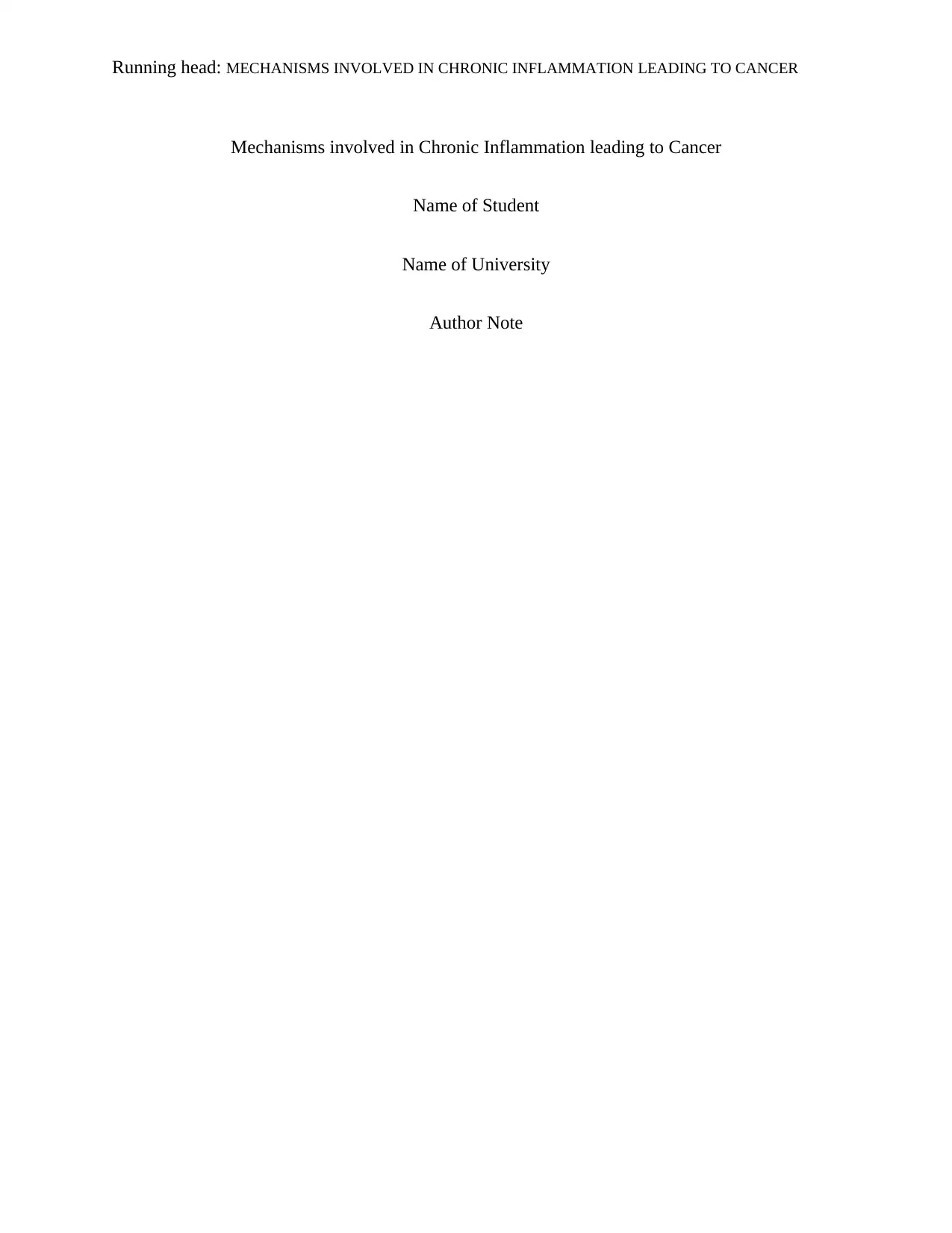
Running head: MECHANISMS INVOLVED IN CHRONIC INFLAMMATION LEADING TO CANCER
Mechanisms involved in Chronic Inflammation leading to Cancer
Name of Student
Name of University
Author Note
Mechanisms involved in Chronic Inflammation leading to Cancer
Name of Student
Name of University
Author Note
Paraphrase This Document
Need a fresh take? Get an instant paraphrase of this document with our AI Paraphraser
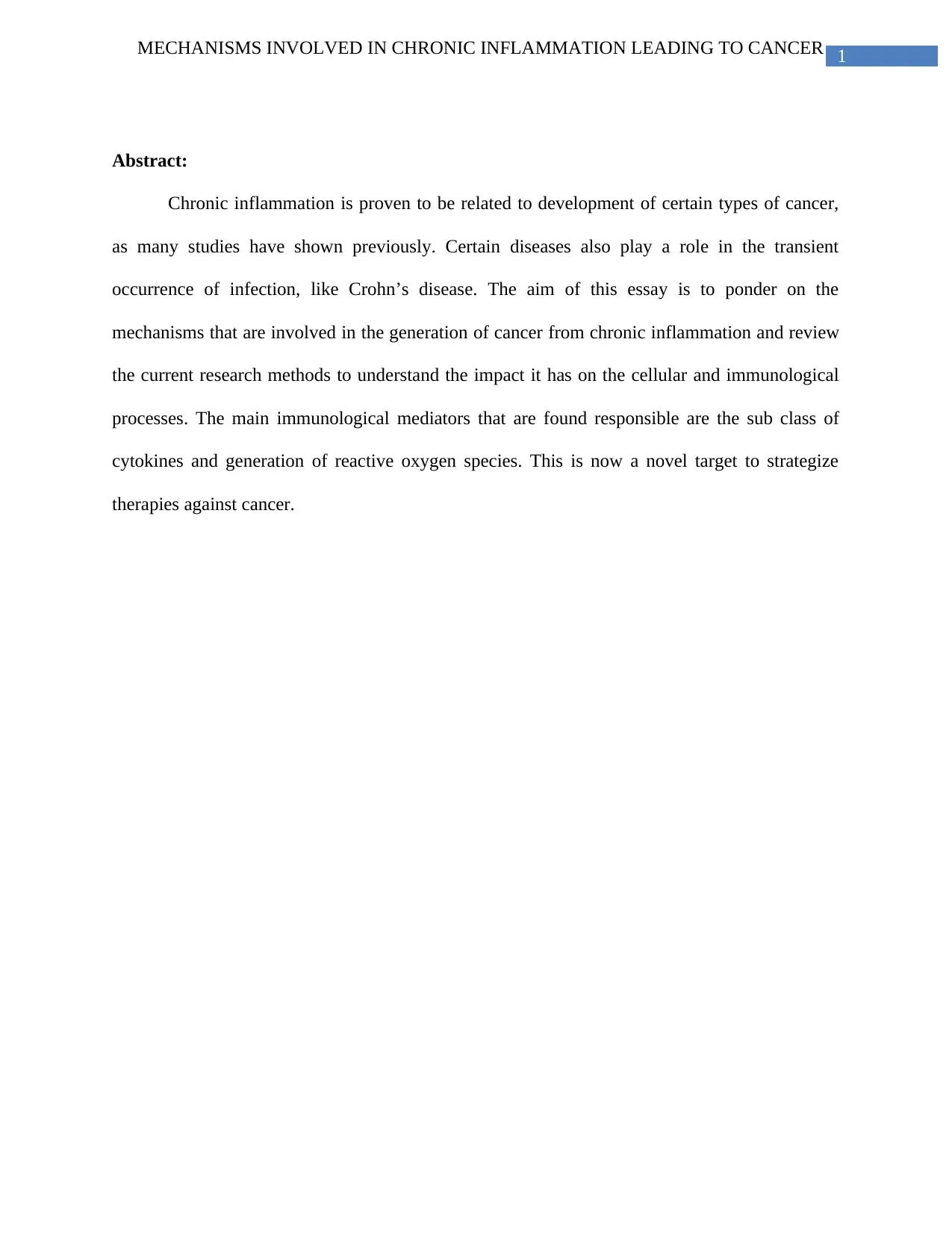
1MECHANISMS INVOLVED IN CHRONIC INFLAMMATION LEADING TO CANCER
Abstract:
Chronic inflammation is proven to be related to development of certain types of cancer,
as many studies have shown previously. Certain diseases also play a role in the transient
occurrence of infection, like Crohn’s disease. The aim of this essay is to ponder on the
mechanisms that are involved in the generation of cancer from chronic inflammation and review
the current research methods to understand the impact it has on the cellular and immunological
processes. The main immunological mediators that are found responsible are the sub class of
cytokines and generation of reactive oxygen species. This is now a novel target to strategize
therapies against cancer.
Abstract:
Chronic inflammation is proven to be related to development of certain types of cancer,
as many studies have shown previously. Certain diseases also play a role in the transient
occurrence of infection, like Crohn’s disease. The aim of this essay is to ponder on the
mechanisms that are involved in the generation of cancer from chronic inflammation and review
the current research methods to understand the impact it has on the cellular and immunological
processes. The main immunological mediators that are found responsible are the sub class of
cytokines and generation of reactive oxygen species. This is now a novel target to strategize
therapies against cancer.
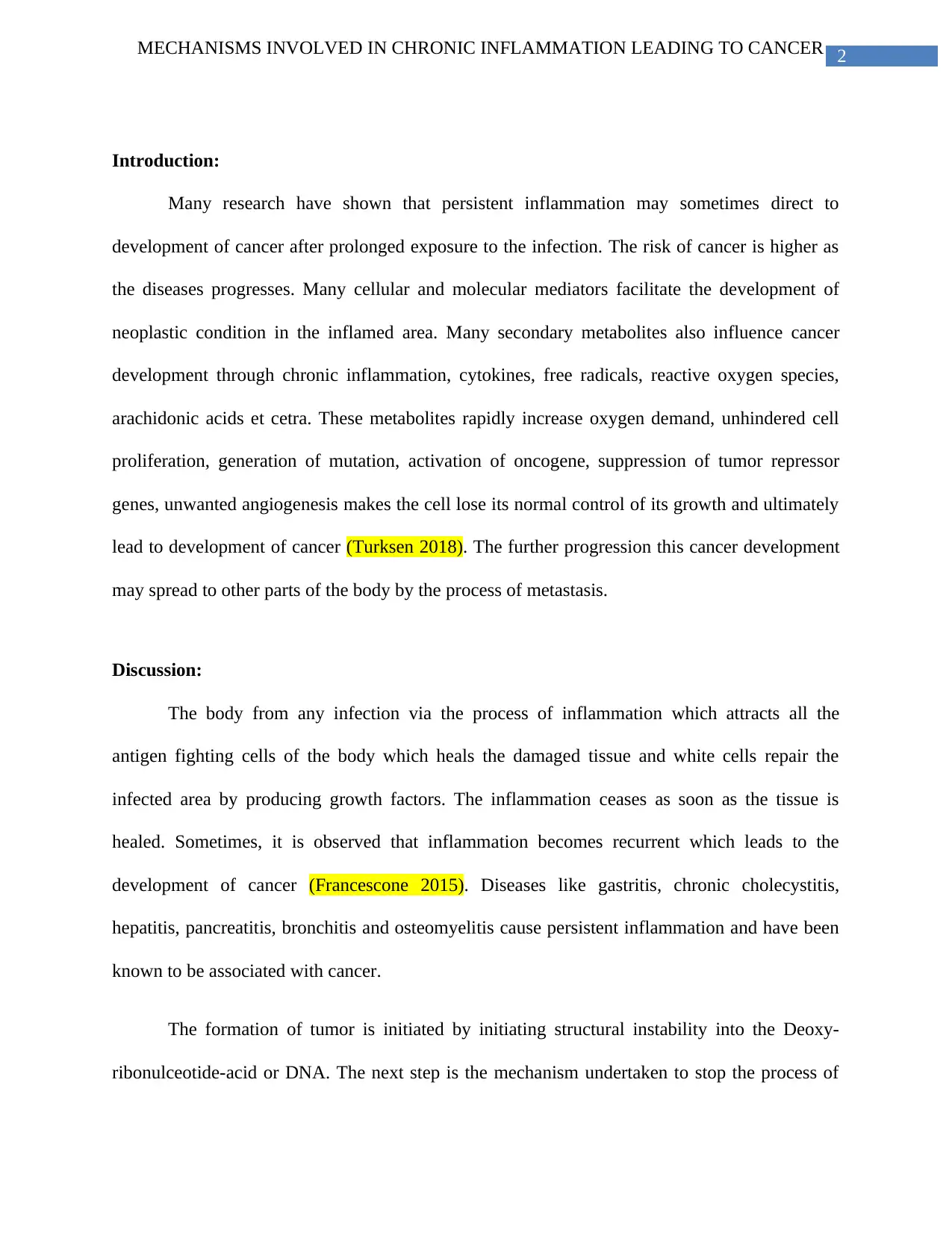
2MECHANISMS INVOLVED IN CHRONIC INFLAMMATION LEADING TO CANCER
Introduction:
Many research have shown that persistent inflammation may sometimes direct to
development of cancer after prolonged exposure to the infection. The risk of cancer is higher as
the diseases progresses. Many cellular and molecular mediators facilitate the development of
neoplastic condition in the inflamed area. Many secondary metabolites also influence cancer
development through chronic inflammation, cytokines, free radicals, reactive oxygen species,
arachidonic acids et cetra. These metabolites rapidly increase oxygen demand, unhindered cell
proliferation, generation of mutation, activation of oncogene, suppression of tumor repressor
genes, unwanted angiogenesis makes the cell lose its normal control of its growth and ultimately
lead to development of cancer (Turksen 2018). The further progression this cancer development
may spread to other parts of the body by the process of metastasis.
Discussion:
The body from any infection via the process of inflammation which attracts all the
antigen fighting cells of the body which heals the damaged tissue and white cells repair the
infected area by producing growth factors. The inflammation ceases as soon as the tissue is
healed. Sometimes, it is observed that inflammation becomes recurrent which leads to the
development of cancer (Francescone 2015). Diseases like gastritis, chronic cholecystitis,
hepatitis, pancreatitis, bronchitis and osteomyelitis cause persistent inflammation and have been
known to be associated with cancer.
The formation of tumor is initiated by initiating structural instability into the Deoxy-
ribonulceotide-acid or DNA. The next step is the mechanism undertaken to stop the process of
Introduction:
Many research have shown that persistent inflammation may sometimes direct to
development of cancer after prolonged exposure to the infection. The risk of cancer is higher as
the diseases progresses. Many cellular and molecular mediators facilitate the development of
neoplastic condition in the inflamed area. Many secondary metabolites also influence cancer
development through chronic inflammation, cytokines, free radicals, reactive oxygen species,
arachidonic acids et cetra. These metabolites rapidly increase oxygen demand, unhindered cell
proliferation, generation of mutation, activation of oncogene, suppression of tumor repressor
genes, unwanted angiogenesis makes the cell lose its normal control of its growth and ultimately
lead to development of cancer (Turksen 2018). The further progression this cancer development
may spread to other parts of the body by the process of metastasis.
Discussion:
The body from any infection via the process of inflammation which attracts all the
antigen fighting cells of the body which heals the damaged tissue and white cells repair the
infected area by producing growth factors. The inflammation ceases as soon as the tissue is
healed. Sometimes, it is observed that inflammation becomes recurrent which leads to the
development of cancer (Francescone 2015). Diseases like gastritis, chronic cholecystitis,
hepatitis, pancreatitis, bronchitis and osteomyelitis cause persistent inflammation and have been
known to be associated with cancer.
The formation of tumor is initiated by initiating structural instability into the Deoxy-
ribonulceotide-acid or DNA. The next step is the mechanism undertaken to stop the process of
⊘ This is a preview!⊘
Do you want full access?
Subscribe today to unlock all pages.

Trusted by 1+ million students worldwide
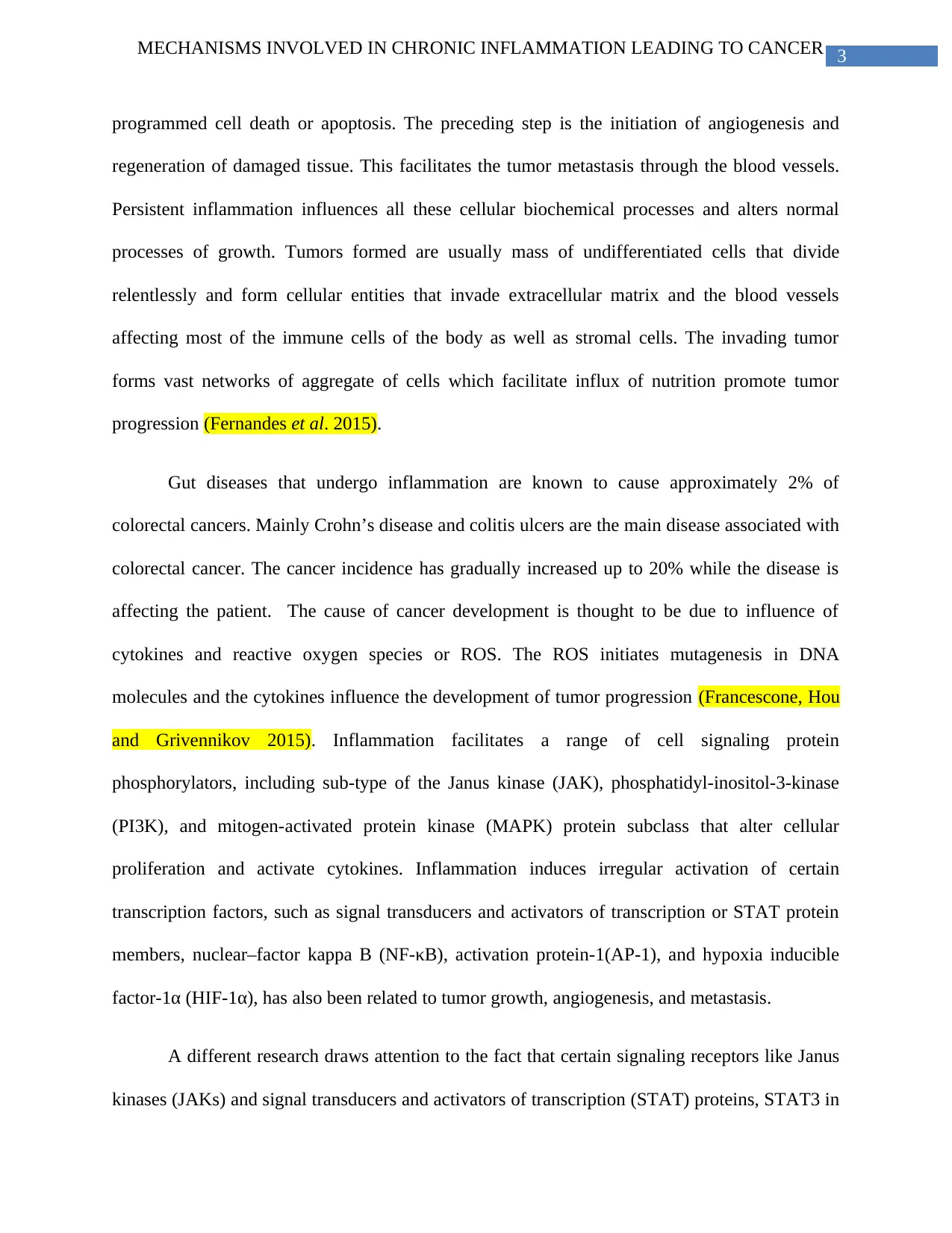
3MECHANISMS INVOLVED IN CHRONIC INFLAMMATION LEADING TO CANCER
programmed cell death or apoptosis. The preceding step is the initiation of angiogenesis and
regeneration of damaged tissue. This facilitates the tumor metastasis through the blood vessels.
Persistent inflammation influences all these cellular biochemical processes and alters normal
processes of growth. Tumors formed are usually mass of undifferentiated cells that divide
relentlessly and form cellular entities that invade extracellular matrix and the blood vessels
affecting most of the immune cells of the body as well as stromal cells. The invading tumor
forms vast networks of aggregate of cells which facilitate influx of nutrition promote tumor
progression (Fernandes et al. 2015).
Gut diseases that undergo inflammation are known to cause approximately 2% of
colorectal cancers. Mainly Crohn’s disease and colitis ulcers are the main disease associated with
colorectal cancer. The cancer incidence has gradually increased up to 20% while the disease is
affecting the patient. The cause of cancer development is thought to be due to influence of
cytokines and reactive oxygen species or ROS. The ROS initiates mutagenesis in DNA
molecules and the cytokines influence the development of tumor progression (Francescone, Hou
and Grivennikov 2015). Inflammation facilitates a range of cell signaling protein
phosphorylators, including sub-type of the Janus kinase (JAK), phosphatidyl-inositol-3-kinase
(PI3K), and mitogen-activated protein kinase (MAPK) protein subclass that alter cellular
proliferation and activate cytokines. Inflammation induces irregular activation of certain
transcription factors, such as signal transducers and activators of transcription or STAT protein
members, nuclear–factor kappa B (NF-κB), activation protein-1(AP-1), and hypoxia inducible
factor-1α (HIF-1α), has also been related to tumor growth, angiogenesis, and metastasis.
A different research draws attention to the fact that certain signaling receptors like Janus
kinases (JAKs) and signal transducers and activators of transcription (STAT) proteins, STAT3 in
programmed cell death or apoptosis. The preceding step is the initiation of angiogenesis and
regeneration of damaged tissue. This facilitates the tumor metastasis through the blood vessels.
Persistent inflammation influences all these cellular biochemical processes and alters normal
processes of growth. Tumors formed are usually mass of undifferentiated cells that divide
relentlessly and form cellular entities that invade extracellular matrix and the blood vessels
affecting most of the immune cells of the body as well as stromal cells. The invading tumor
forms vast networks of aggregate of cells which facilitate influx of nutrition promote tumor
progression (Fernandes et al. 2015).
Gut diseases that undergo inflammation are known to cause approximately 2% of
colorectal cancers. Mainly Crohn’s disease and colitis ulcers are the main disease associated with
colorectal cancer. The cancer incidence has gradually increased up to 20% while the disease is
affecting the patient. The cause of cancer development is thought to be due to influence of
cytokines and reactive oxygen species or ROS. The ROS initiates mutagenesis in DNA
molecules and the cytokines influence the development of tumor progression (Francescone, Hou
and Grivennikov 2015). Inflammation facilitates a range of cell signaling protein
phosphorylators, including sub-type of the Janus kinase (JAK), phosphatidyl-inositol-3-kinase
(PI3K), and mitogen-activated protein kinase (MAPK) protein subclass that alter cellular
proliferation and activate cytokines. Inflammation induces irregular activation of certain
transcription factors, such as signal transducers and activators of transcription or STAT protein
members, nuclear–factor kappa B (NF-κB), activation protein-1(AP-1), and hypoxia inducible
factor-1α (HIF-1α), has also been related to tumor growth, angiogenesis, and metastasis.
A different research draws attention to the fact that certain signaling receptors like Janus
kinases (JAKs) and signal transducers and activators of transcription (STAT) proteins, STAT3 in
Paraphrase This Document
Need a fresh take? Get an instant paraphrase of this document with our AI Paraphraser
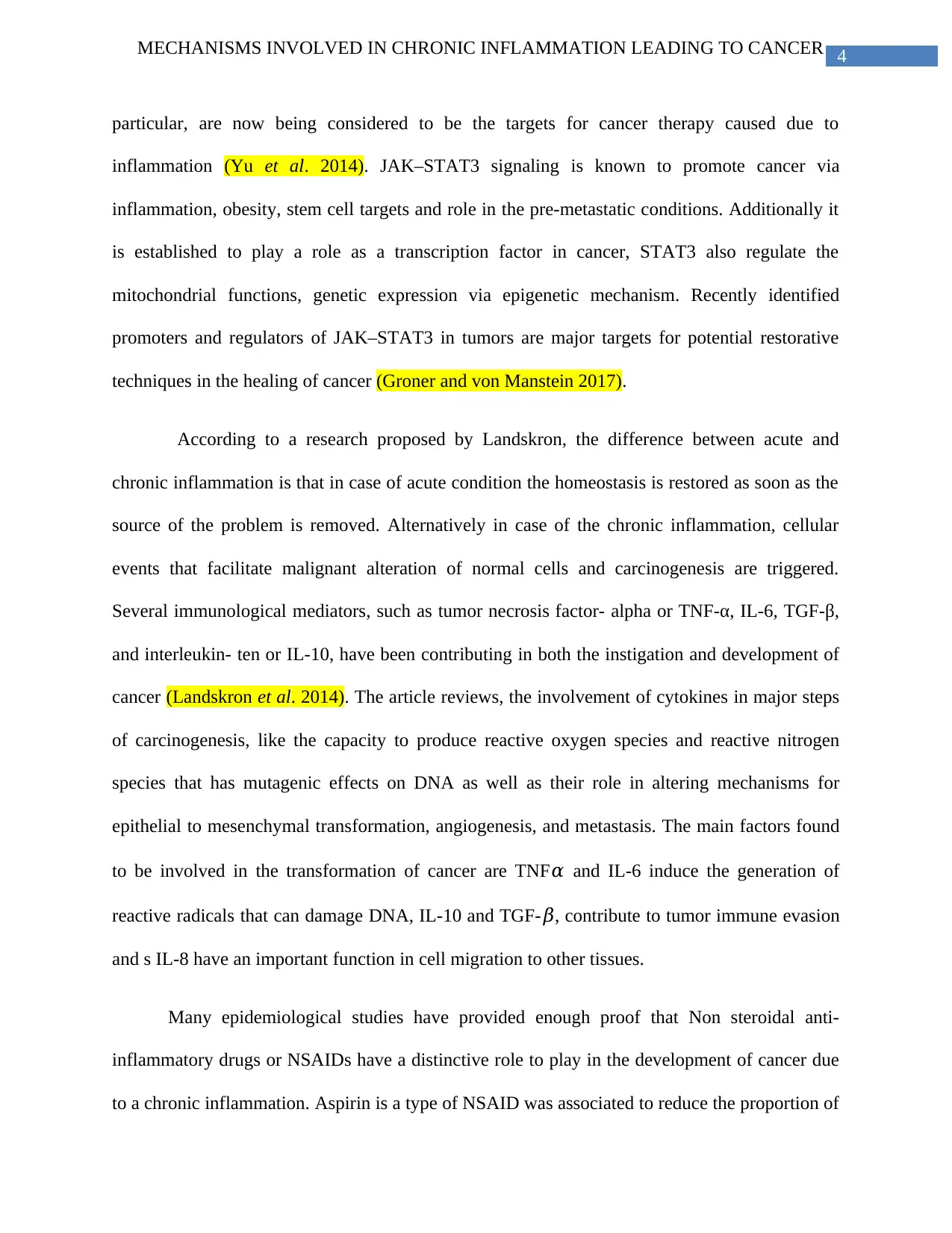
4MECHANISMS INVOLVED IN CHRONIC INFLAMMATION LEADING TO CANCER
particular, are now being considered to be the targets for cancer therapy caused due to
inflammation (Yu et al. 2014). JAK–STAT3 signaling is known to promote cancer via
inflammation, obesity, stem cell targets and role in the pre-metastatic conditions. Additionally it
is established to play a role as a transcription factor in cancer, STAT3 also regulate the
mitochondrial functions, genetic expression via epigenetic mechanism. Recently identified
promoters and regulators of JAK–STAT3 in tumors are major targets for potential restorative
techniques in the healing of cancer (Groner and von Manstein 2017).
According to a research proposed by Landskron, the difference between acute and
chronic inflammation is that in case of acute condition the homeostasis is restored as soon as the
source of the problem is removed. Alternatively in case of the chronic inflammation, cellular
events that facilitate malignant alteration of normal cells and carcinogenesis are triggered.
Several immunological mediators, such as tumor necrosis factor- alpha or TNF-α, IL-6, TGF-β,
and interleukin- ten or IL-10, have been contributing in both the instigation and development of
cancer (Landskron et al. 2014). The article reviews, the involvement of cytokines in major steps
of carcinogenesis, like the capacity to produce reactive oxygen species and reactive nitrogen
species that has mutagenic effects on DNA as well as their role in altering mechanisms for
epithelial to mesenchymal transformation, angiogenesis, and metastasis. The main factors found
to be involved in the transformation of cancer are TNF𝛼 and IL-6 induce the generation of
reactive radicals that can damage DNA, IL-10 and TGF-𝛽, contribute to tumor immune evasion
and s IL-8 have an important function in cell migration to other tissues.
Many epidemiological studies have provided enough proof that Non steroidal anti-
inflammatory drugs or NSAIDs have a distinctive role to play in the development of cancer due
to a chronic inflammation. Aspirin is a type of NSAID was associated to reduce the proportion of
particular, are now being considered to be the targets for cancer therapy caused due to
inflammation (Yu et al. 2014). JAK–STAT3 signaling is known to promote cancer via
inflammation, obesity, stem cell targets and role in the pre-metastatic conditions. Additionally it
is established to play a role as a transcription factor in cancer, STAT3 also regulate the
mitochondrial functions, genetic expression via epigenetic mechanism. Recently identified
promoters and regulators of JAK–STAT3 in tumors are major targets for potential restorative
techniques in the healing of cancer (Groner and von Manstein 2017).
According to a research proposed by Landskron, the difference between acute and
chronic inflammation is that in case of acute condition the homeostasis is restored as soon as the
source of the problem is removed. Alternatively in case of the chronic inflammation, cellular
events that facilitate malignant alteration of normal cells and carcinogenesis are triggered.
Several immunological mediators, such as tumor necrosis factor- alpha or TNF-α, IL-6, TGF-β,
and interleukin- ten or IL-10, have been contributing in both the instigation and development of
cancer (Landskron et al. 2014). The article reviews, the involvement of cytokines in major steps
of carcinogenesis, like the capacity to produce reactive oxygen species and reactive nitrogen
species that has mutagenic effects on DNA as well as their role in altering mechanisms for
epithelial to mesenchymal transformation, angiogenesis, and metastasis. The main factors found
to be involved in the transformation of cancer are TNF𝛼 and IL-6 induce the generation of
reactive radicals that can damage DNA, IL-10 and TGF-𝛽, contribute to tumor immune evasion
and s IL-8 have an important function in cell migration to other tissues.
Many epidemiological studies have provided enough proof that Non steroidal anti-
inflammatory drugs or NSAIDs have a distinctive role to play in the development of cancer due
to a chronic inflammation. Aspirin is a type of NSAID was associated to reduce the proportion of
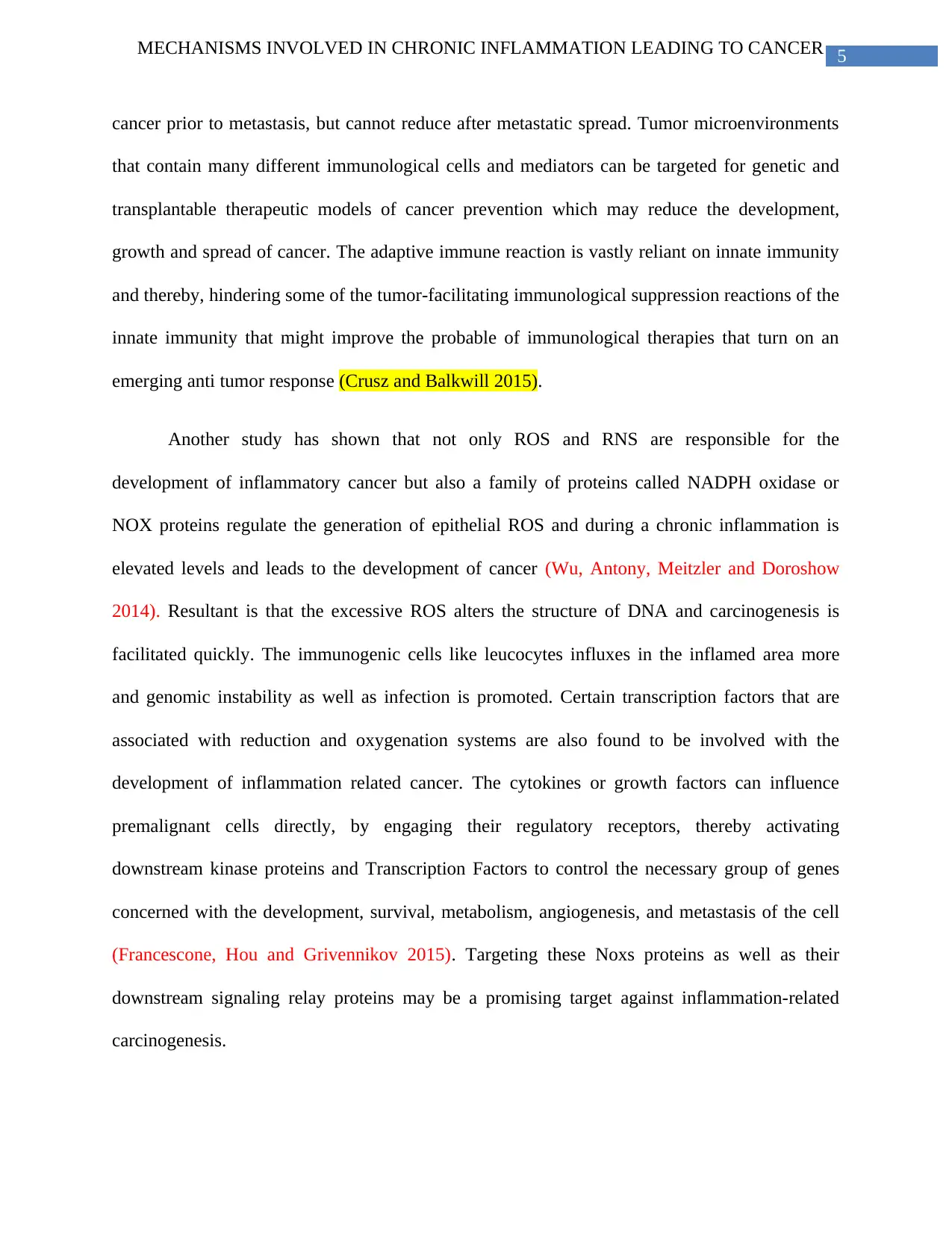
5MECHANISMS INVOLVED IN CHRONIC INFLAMMATION LEADING TO CANCER
cancer prior to metastasis, but cannot reduce after metastatic spread. Tumor microenvironments
that contain many different immunological cells and mediators can be targeted for genetic and
transplantable therapeutic models of cancer prevention which may reduce the development,
growth and spread of cancer. The adaptive immune reaction is vastly reliant on innate immunity
and thereby, hindering some of the tumor-facilitating immunological suppression reactions of the
innate immunity that might improve the probable of immunological therapies that turn on an
emerging anti tumor response (Crusz and Balkwill 2015).
Another study has shown that not only ROS and RNS are responsible for the
development of inflammatory cancer but also a family of proteins called NADPH oxidase or
NOX proteins regulate the generation of epithelial ROS and during a chronic inflammation is
elevated levels and leads to the development of cancer (Wu, Antony, Meitzler and Doroshow
2014). Resultant is that the excessive ROS alters the structure of DNA and carcinogenesis is
facilitated quickly. The immunogenic cells like leucocytes influxes in the inflamed area more
and genomic instability as well as infection is promoted. Certain transcription factors that are
associated with reduction and oxygenation systems are also found to be involved with the
development of inflammation related cancer. The cytokines or growth factors can influence
premalignant cells directly, by engaging their regulatory receptors, thereby activating
downstream kinase proteins and Transcription Factors to control the necessary group of genes
concerned with the development, survival, metabolism, angiogenesis, and metastasis of the cell
(Francescone, Hou and Grivennikov 2015). Targeting these Noxs proteins as well as their
downstream signaling relay proteins may be a promising target against inflammation-related
carcinogenesis.
cancer prior to metastasis, but cannot reduce after metastatic spread. Tumor microenvironments
that contain many different immunological cells and mediators can be targeted for genetic and
transplantable therapeutic models of cancer prevention which may reduce the development,
growth and spread of cancer. The adaptive immune reaction is vastly reliant on innate immunity
and thereby, hindering some of the tumor-facilitating immunological suppression reactions of the
innate immunity that might improve the probable of immunological therapies that turn on an
emerging anti tumor response (Crusz and Balkwill 2015).
Another study has shown that not only ROS and RNS are responsible for the
development of inflammatory cancer but also a family of proteins called NADPH oxidase or
NOX proteins regulate the generation of epithelial ROS and during a chronic inflammation is
elevated levels and leads to the development of cancer (Wu, Antony, Meitzler and Doroshow
2014). Resultant is that the excessive ROS alters the structure of DNA and carcinogenesis is
facilitated quickly. The immunogenic cells like leucocytes influxes in the inflamed area more
and genomic instability as well as infection is promoted. Certain transcription factors that are
associated with reduction and oxygenation systems are also found to be involved with the
development of inflammation related cancer. The cytokines or growth factors can influence
premalignant cells directly, by engaging their regulatory receptors, thereby activating
downstream kinase proteins and Transcription Factors to control the necessary group of genes
concerned with the development, survival, metabolism, angiogenesis, and metastasis of the cell
(Francescone, Hou and Grivennikov 2015). Targeting these Noxs proteins as well as their
downstream signaling relay proteins may be a promising target against inflammation-related
carcinogenesis.
⊘ This is a preview!⊘
Do you want full access?
Subscribe today to unlock all pages.

Trusted by 1+ million students worldwide
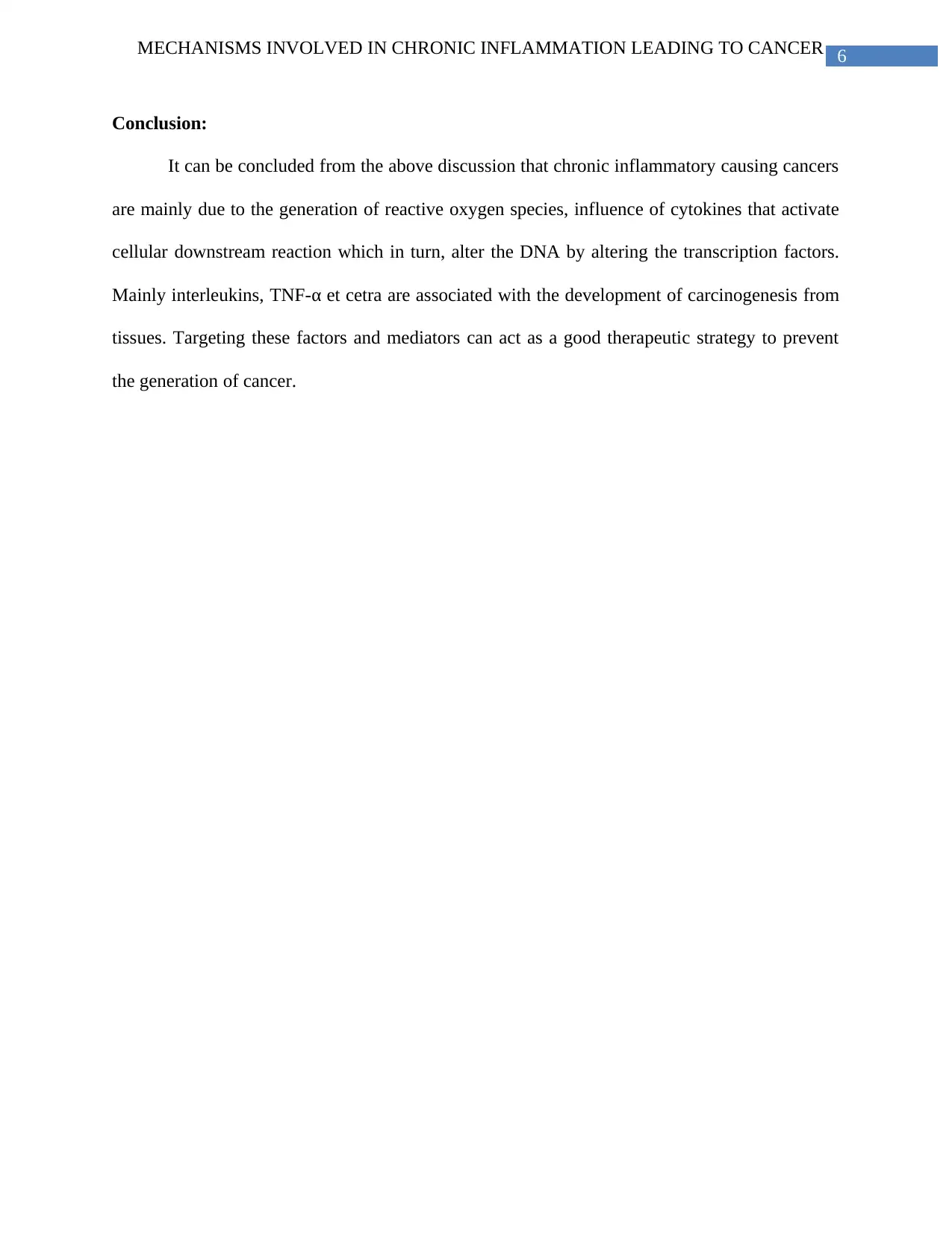
6MECHANISMS INVOLVED IN CHRONIC INFLAMMATION LEADING TO CANCER
Conclusion:
It can be concluded from the above discussion that chronic inflammatory causing cancers
are mainly due to the generation of reactive oxygen species, influence of cytokines that activate
cellular downstream reaction which in turn, alter the DNA by altering the transcription factors.
Mainly interleukins, TNF-α et cetra are associated with the development of carcinogenesis from
tissues. Targeting these factors and mediators can act as a good therapeutic strategy to prevent
the generation of cancer.
Conclusion:
It can be concluded from the above discussion that chronic inflammatory causing cancers
are mainly due to the generation of reactive oxygen species, influence of cytokines that activate
cellular downstream reaction which in turn, alter the DNA by altering the transcription factors.
Mainly interleukins, TNF-α et cetra are associated with the development of carcinogenesis from
tissues. Targeting these factors and mediators can act as a good therapeutic strategy to prevent
the generation of cancer.
Paraphrase This Document
Need a fresh take? Get an instant paraphrase of this document with our AI Paraphraser
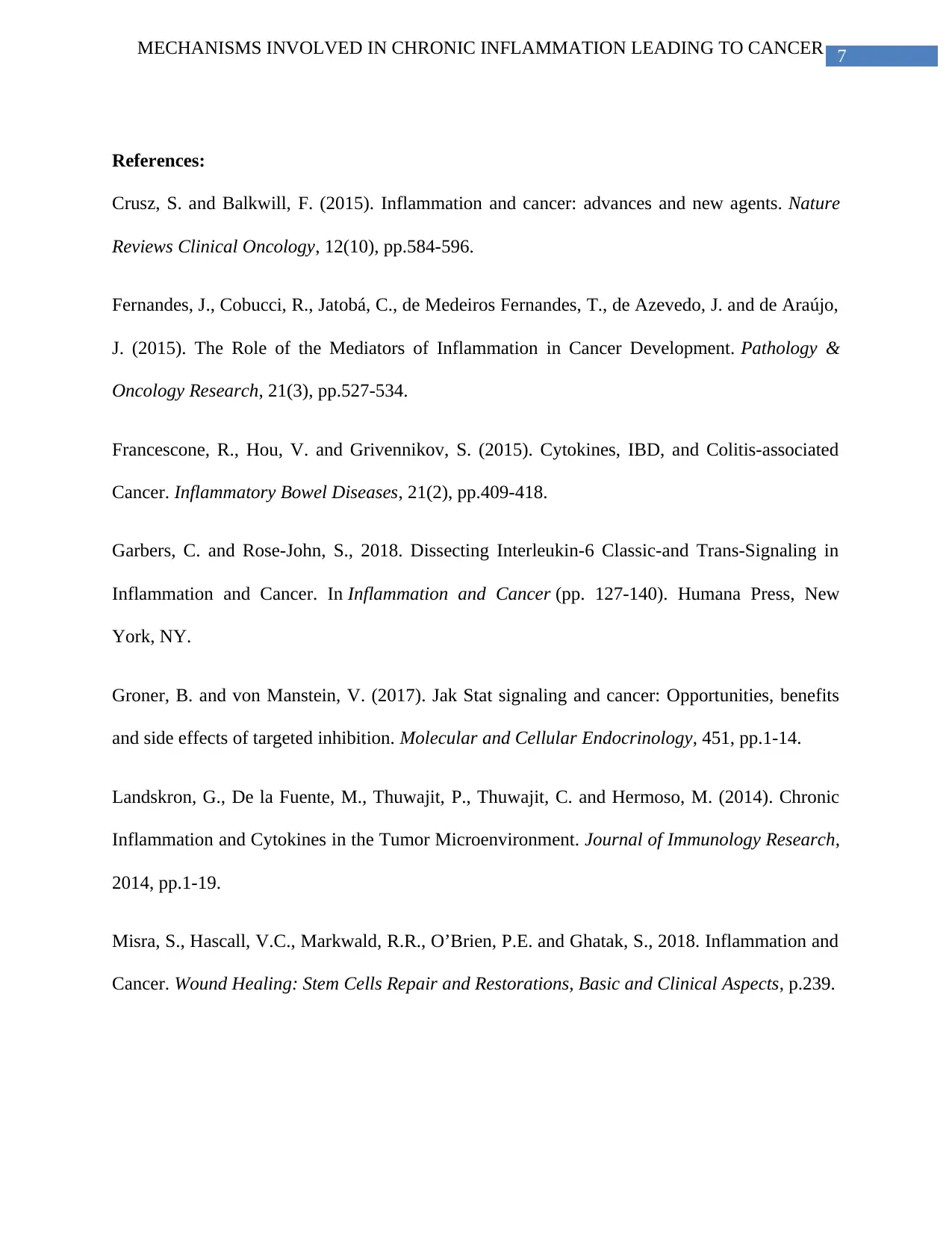
7MECHANISMS INVOLVED IN CHRONIC INFLAMMATION LEADING TO CANCER
References:
Crusz, S. and Balkwill, F. (2015). Inflammation and cancer: advances and new agents. Nature
Reviews Clinical Oncology, 12(10), pp.584-596.
Fernandes, J., Cobucci, R., Jatobá, C., de Medeiros Fernandes, T., de Azevedo, J. and de Araújo,
J. (2015). The Role of the Mediators of Inflammation in Cancer Development. Pathology &
Oncology Research, 21(3), pp.527-534.
Francescone, R., Hou, V. and Grivennikov, S. (2015). Cytokines, IBD, and Colitis-associated
Cancer. Inflammatory Bowel Diseases, 21(2), pp.409-418.
Garbers, C. and Rose-John, S., 2018. Dissecting Interleukin-6 Classic-and Trans-Signaling in
Inflammation and Cancer. In Inflammation and Cancer (pp. 127-140). Humana Press, New
York, NY.
Groner, B. and von Manstein, V. (2017). Jak Stat signaling and cancer: Opportunities, benefits
and side effects of targeted inhibition. Molecular and Cellular Endocrinology, 451, pp.1-14.
Landskron, G., De la Fuente, M., Thuwajit, P., Thuwajit, C. and Hermoso, M. (2014). Chronic
Inflammation and Cytokines in the Tumor Microenvironment. Journal of Immunology Research,
2014, pp.1-19.
Misra, S., Hascall, V.C., Markwald, R.R., O’Brien, P.E. and Ghatak, S., 2018. Inflammation and
Cancer. Wound Healing: Stem Cells Repair and Restorations, Basic and Clinical Aspects, p.239.
References:
Crusz, S. and Balkwill, F. (2015). Inflammation and cancer: advances and new agents. Nature
Reviews Clinical Oncology, 12(10), pp.584-596.
Fernandes, J., Cobucci, R., Jatobá, C., de Medeiros Fernandes, T., de Azevedo, J. and de Araújo,
J. (2015). The Role of the Mediators of Inflammation in Cancer Development. Pathology &
Oncology Research, 21(3), pp.527-534.
Francescone, R., Hou, V. and Grivennikov, S. (2015). Cytokines, IBD, and Colitis-associated
Cancer. Inflammatory Bowel Diseases, 21(2), pp.409-418.
Garbers, C. and Rose-John, S., 2018. Dissecting Interleukin-6 Classic-and Trans-Signaling in
Inflammation and Cancer. In Inflammation and Cancer (pp. 127-140). Humana Press, New
York, NY.
Groner, B. and von Manstein, V. (2017). Jak Stat signaling and cancer: Opportunities, benefits
and side effects of targeted inhibition. Molecular and Cellular Endocrinology, 451, pp.1-14.
Landskron, G., De la Fuente, M., Thuwajit, P., Thuwajit, C. and Hermoso, M. (2014). Chronic
Inflammation and Cytokines in the Tumor Microenvironment. Journal of Immunology Research,
2014, pp.1-19.
Misra, S., Hascall, V.C., Markwald, R.R., O’Brien, P.E. and Ghatak, S., 2018. Inflammation and
Cancer. Wound Healing: Stem Cells Repair and Restorations, Basic and Clinical Aspects, p.239.
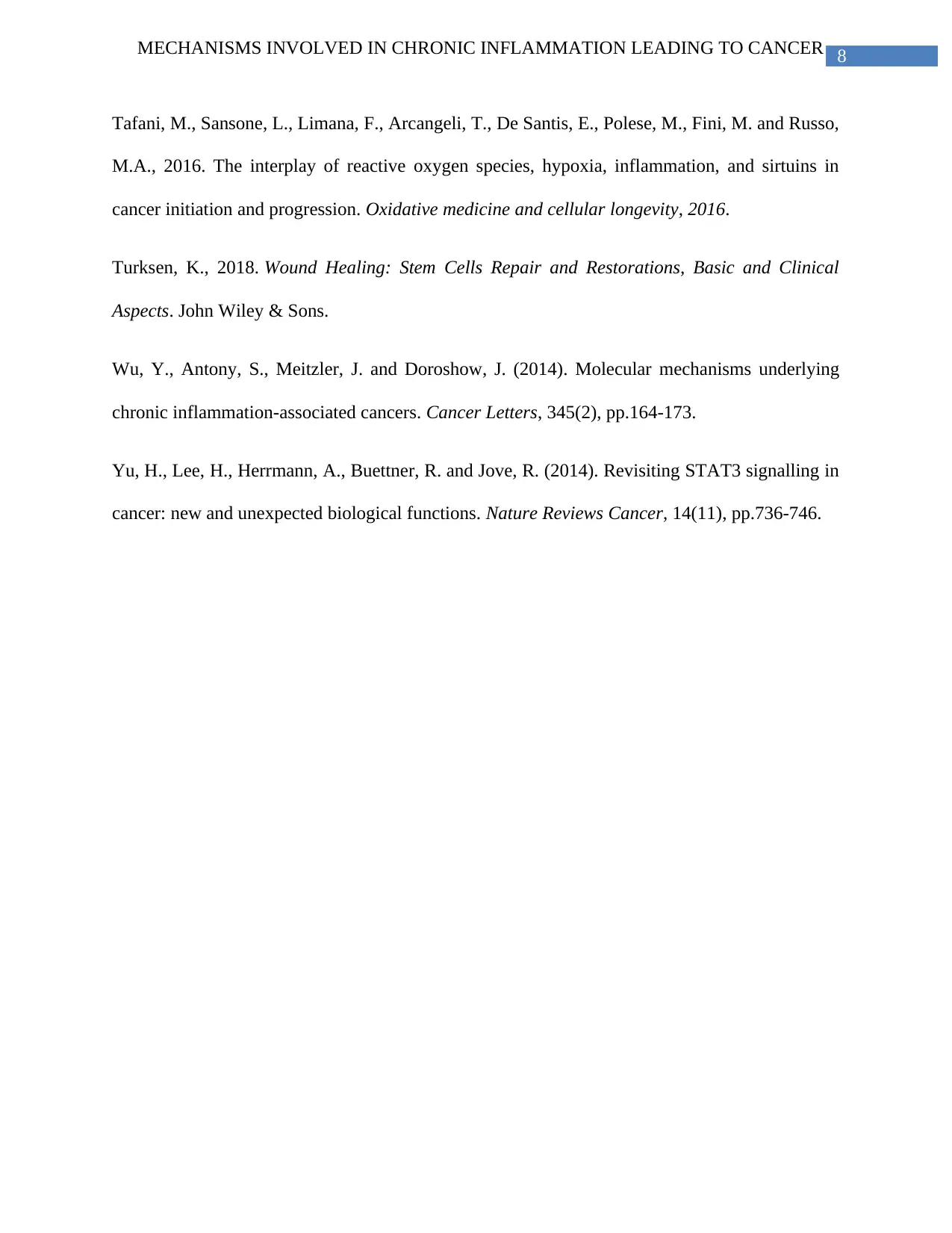
8MECHANISMS INVOLVED IN CHRONIC INFLAMMATION LEADING TO CANCER
Tafani, M., Sansone, L., Limana, F., Arcangeli, T., De Santis, E., Polese, M., Fini, M. and Russo,
M.A., 2016. The interplay of reactive oxygen species, hypoxia, inflammation, and sirtuins in
cancer initiation and progression. Oxidative medicine and cellular longevity, 2016.
Turksen, K., 2018. Wound Healing: Stem Cells Repair and Restorations, Basic and Clinical
Aspects. John Wiley & Sons.
Wu, Y., Antony, S., Meitzler, J. and Doroshow, J. (2014). Molecular mechanisms underlying
chronic inflammation-associated cancers. Cancer Letters, 345(2), pp.164-173.
Yu, H., Lee, H., Herrmann, A., Buettner, R. and Jove, R. (2014). Revisiting STAT3 signalling in
cancer: new and unexpected biological functions. Nature Reviews Cancer, 14(11), pp.736-746.
Tafani, M., Sansone, L., Limana, F., Arcangeli, T., De Santis, E., Polese, M., Fini, M. and Russo,
M.A., 2016. The interplay of reactive oxygen species, hypoxia, inflammation, and sirtuins in
cancer initiation and progression. Oxidative medicine and cellular longevity, 2016.
Turksen, K., 2018. Wound Healing: Stem Cells Repair and Restorations, Basic and Clinical
Aspects. John Wiley & Sons.
Wu, Y., Antony, S., Meitzler, J. and Doroshow, J. (2014). Molecular mechanisms underlying
chronic inflammation-associated cancers. Cancer Letters, 345(2), pp.164-173.
Yu, H., Lee, H., Herrmann, A., Buettner, R. and Jove, R. (2014). Revisiting STAT3 signalling in
cancer: new and unexpected biological functions. Nature Reviews Cancer, 14(11), pp.736-746.
⊘ This is a preview!⊘
Do you want full access?
Subscribe today to unlock all pages.

Trusted by 1+ million students worldwide
1 out of 9
Related Documents
Your All-in-One AI-Powered Toolkit for Academic Success.
+13062052269
info@desklib.com
Available 24*7 on WhatsApp / Email
![[object Object]](/_next/static/media/star-bottom.7253800d.svg)
Unlock your academic potential
Copyright © 2020–2026 A2Z Services. All Rights Reserved. Developed and managed by ZUCOL.




